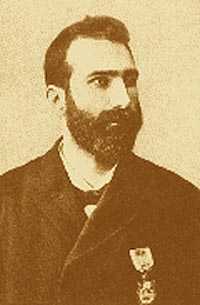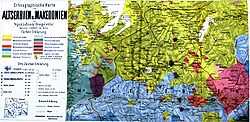Spiridon Gopčević

Spiridon Gopčević, nom de plume Leo Brenner[1] (Serbian Cyrillic: Спиридон Гопчевић; July 9, 1855–1928) was a Serbian-Austrian astronomer and historian born in Trieste.
Life
His father, also named Spiridon, was a great shipowner in Trieste, then Austrian Littoral (modern Italy), but had originated from the village of Podi near Herceg Novi, in Boka Kotorska (modern Montenegro), then a part of the Austrian Empire. After the death of his father, when Spiridon was a boy, he was sent to Vienna to be educated. Following the death of his mother, he became a journalist by trade.

Among his works he published Old Serbia and Macedonia in 1889, an ethnographic study. However he spent time in jail in 1893 due to some of his articles against the Austro-Hungarian government, and decided to end his journalistic career. Astronomy became the dominant interest in Gopčević's life and, to a most unusual extent, his work was his life and his life was his work.
In 1893 he founded Manora Observatory on Mali Lošinj in present-day Croatia. This observatory was named for his wife, a wealthy Austrian noblewoman. At this observatory, Spiridon used the 17.5 cm refractor telescope at the observatory to make observations of Mars, the rings of Saturn, and other planets. However he would eventually close the observatory in 1909 due to financial problems, and the telescope was offered for sale.[2]
From 1899 until 1908 he was the founder and editor of the Astronomische Rundschau, a popular scientific journal. He spent several years in America before returning to Europe and editing an army journal in Berlin during the war. The circumstances of his death are somewhat uncertain, but he appears to have been impoverished.
The crater Brenner on the Moon was named after him (based on his nom de plume) by his friend Phillip Fauth. A new observatory was built on Mali Lošinj in 1993, and was named “Leo Brenner“.
Works
- Montenegro und die Montenegriner, 1877
- Oberalbanien und seine Liga, 1881
- Bulgarien und Ostrumelien, 1886
- Kriegsgeschichtliche Studien, 2 Bände, 1887
- Makedonien und Alt-Serbien, 1889
- (als Leo Brenner): Beobachtungs-Objekte für Amateur-Astronomen, 1902
- USA. Aus dem Dollarlande; Sitten, Zustände und Einrichtungen der Vereinigten Staaten, 1913
- Das Fürstentum Albanien, seine Vergangenheit, ethnographischen Verhältnisse, politische Lage und Aussichten für die Zukunft, 1914
- Geschichte von Montenegro und Albanien, 1914
- Aus dem Lande der unbegrenzten Heuchelei. Englische Zustände, 1915
- Rußland und Serbien von 1804-1915. Nach Urkunden der Geheimarchive von St. Petersburg und Paris und des Wiener Archivs, 1916
- Amerikas Rolle im Weltkriege, 1917
- Die Wahrheit über Jesus nach den ausgegrabenen Aufzeichnungen seines Jugendfreundes, 1920
- Kulturgeschichtliche Studien, 1920
- Österreichs Untergang : die Folge von Franz Josefs Mißregierung, 1920
- Serbokroatisches Gesprächsbuch verbunden mit kurzer Sprachlehre und Wörterverzeichnis, 1920
See also
References
- ↑ Hodge, Carl Cavanagh (2007). Encyclopedia of the Age of Imperialism, 1800-1914 2. Greenwood Publishing Group. p. 441. ISBN 9780890968970.
- ↑ Brenner, Leo, "postcard" (PDF). p. 57.